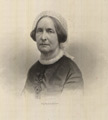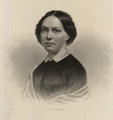Aid societies began organizing in small towns throughout the Union, even as able-bodied men and boys were organizing military units to answer President Abraham Lincoln's call for troops. Some local aid societies formed around existing charities such as the YMCA or other faith-based groups; others were entirely new. Leaders were chosen from among the socially prominent women and men. They held meetings to organize their efforts, plan fundraisers, or make supplies as a group like women's sewing circles. Many women volunteered their time and skills and donated home-made goods or money to support the war effort while shouldering the burden of running families, farms, and businesses for their absent men.
While much of these donated goods were intended for their own soldiers, the surplus was sent to other soldiers in the field or in newly established military hospitals. The initial outpouring of donations in 1861 was overwhelming; railroads and transport services could not efficiently deliver all the boxes. Some soldiers wrote home to ask loved ones to rotate delivery of gifts, allowing boxes to arrive one at a time and be shared among tent mates.
Seeing a need for better coordination of their efforts, larger aid societies established networks with the smaller ones, and some larger societies eventually coordinated efforts in a state or region. Regional aid societies sent letters and pamphlets outlining specific needs, giving ideas of how to meet them, and providing encouragement to sustain the efforts of local aid societies despite setbacks in the war. The regional societies ensured that supplies were delivered where needed, coordinated volunteers to work in hospitals, and investigated conditions in camps and hospitals.
Some aid societies organized piece-work for government contracts, such as sewing flannel shirts at home, that provided an income for poor women while their husbands were at war. Following Chicago's example, many of the larger aid societies organized massive public fundraisers called "sanitary fairs." President Marianne F. Stranahan (also spelled Mariamne F. Stranahan) of the Women's Relief Association of Brooklyn and Long Island was instrumental in planning the "Great Fair of Brooklyn" which raised at least half a million dollars in cash and supplies.



